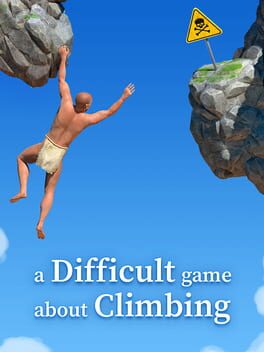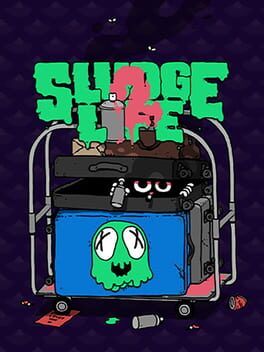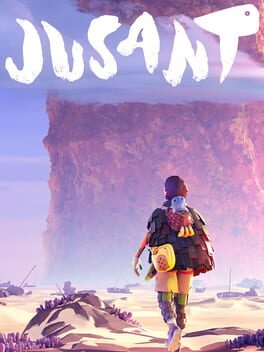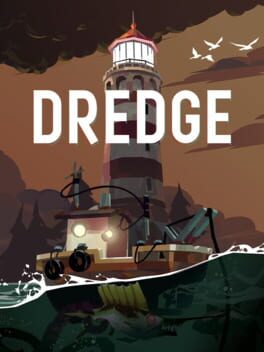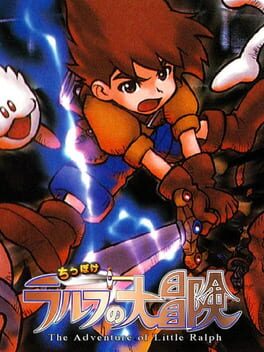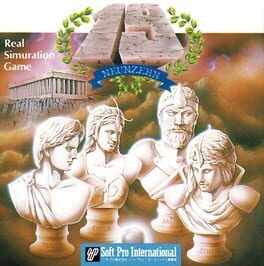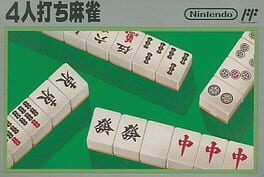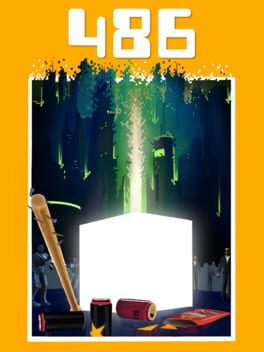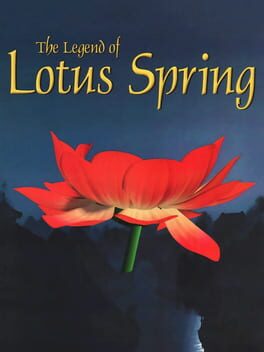vibekei
52 reviews liked by vibekei
Took one look at this game and said "oh streamer ragebait climber bennett foddy rip off" and nearly passed on it, but I noticed it was by the same solo dev as punch a bunch, which ended up being quite rewarding once I got used to the strange controls, so I figured I'd see if that was the case here as well.
I was then completely walled on the game's first proper obstacle, a simple jump. The controls felt weird, the climb back required an intended but precise skip, I could do the jump but I'd fall right before the next safe point.
I quit the game then and there.
Then the thought of "losing" to this game crept its way into my head; "I know I'm good at games, I Got Over It, with Bennett Foddy, I surely I can do the tutorial of its weird clone. That's it I'll beat the tutorial and then uninstall this stupid game."
After being stuck for more days of casual attempts, I finally overcame that first hurdle, and now I had some confidence, the controls had become comfortable. The exact same pattern as Punch A Bunch and its weird physics punching repeated itself.
All that to say, it's okay. It's obviously much shallower than Getting Over It (no ethos to be found here, just climbing) but despite the name it prioritizes creating fun climbing challenges rather than being as balls-hard as possible. The regularly spaced resting pools, and other well placed handholds, made me feel as though I was being (somewhat) protected from the brutal reality of vertical ascension; to begin with, as long as you can chain solid grip to solid grip there's virtually no risk of failure. This gives a strong feeling of fairness to the chaotic physicsy world; anything more precarious, like balancing a hammer on a cliff, would force the game to lock itself in a static state, or else become a physics based casino.
So this game surprised me with how much I enjoyed it, even though I had already seen the speedrun before committing to play it did nothing to lessen the enjoyment of going through and doing it myself. I think we needed a pretty good game about climbing.
I was then completely walled on the game's first proper obstacle, a simple jump. The controls felt weird, the climb back required an intended but precise skip, I could do the jump but I'd fall right before the next safe point.
I quit the game then and there.
Then the thought of "losing" to this game crept its way into my head; "I know I'm good at games, I Got Over It, with Bennett Foddy, I surely I can do the tutorial of its weird clone. That's it I'll beat the tutorial and then uninstall this stupid game."
After being stuck for more days of casual attempts, I finally overcame that first hurdle, and now I had some confidence, the controls had become comfortable. The exact same pattern as Punch A Bunch and its weird physics punching repeated itself.
All that to say, it's okay. It's obviously much shallower than Getting Over It (no ethos to be found here, just climbing) but despite the name it prioritizes creating fun climbing challenges rather than being as balls-hard as possible. The regularly spaced resting pools, and other well placed handholds, made me feel as though I was being (somewhat) protected from the brutal reality of vertical ascension; to begin with, as long as you can chain solid grip to solid grip there's virtually no risk of failure. This gives a strong feeling of fairness to the chaotic physicsy world; anything more precarious, like balancing a hammer on a cliff, would force the game to lock itself in a static state, or else become a physics based casino.
So this game surprised me with how much I enjoyed it, even though I had already seen the speedrun before committing to play it did nothing to lessen the enjoyment of going through and doing it myself. I think we needed a pretty good game about climbing.
Sludge Life 2
2023
To be as reductive as possible for a second, in this game you just walk around and click on stuff. The game is in the setting, presentation and writing your only challenge is ambling around to find all the "content".
But really, it is a very intricately crafted ugly little world. the humour layers on itself, building on self references littered around the game, most gags are singular but the best ones require making connections between events miles apart in the game world, trusting the player to pay attention and find the punchlines themselves.
Immersing yourself into this egregiously suckass place, really wallowing in the counterculture, is what makes the experience worth it. I really felt this game speak a rebuttal to the irony-poisoned nihilism you see in similar works. This isn't just depression porn, beneath all the obscenity and societal rot are sincerely resisting the sub-orbital trajectory of their shitty lives.
But really, it is a very intricately crafted ugly little world. the humour layers on itself, building on self references littered around the game, most gags are singular but the best ones require making connections between events miles apart in the game world, trusting the player to pay attention and find the punchlines themselves.
Immersing yourself into this egregiously suckass place, really wallowing in the counterculture, is what makes the experience worth it. I really felt this game speak a rebuttal to the irony-poisoned nihilism you see in similar works. This isn't just depression porn, beneath all the obscenity and societal rot are sincerely resisting the sub-orbital trajectory of their shitty lives.
Alan Wake Remastered
2021
Starts pretty bad, then gets better as it goes and peaking at the DLC.
The early game is slow, unsubtle and entirely too reliant on the "gotta fight to find my wife" tough guy shtick that dominated games of this era. Eventually, Wake develops some self awareness, the gameplay fills out with equipment choices and the plot picks up enough momentum to shake off the dated tropes and deliver on the admittedly cool core premise.
In terms of combat, it's just enough to be serviceable, but barely. Managing light and ballistic damage simultaneously is more interesting than either mechanic separately. Overall it feels clunky, far too often did I find myself shouting at Alan to do what I ask of him, while an enemy appears behind me right when my invisible stamina bar has run out.
There is a level of dynamism injected by the physics engine, something that Remedy would lean into later on with Control. The poltergeisted objects are so fun as enemies, it now seems logical to have them as a core ability in Control.
The DLC is worth a special mention. In a game that already felt like the developers were getting better as they made the game, the DLC episodes gave them the freedom to lean into the game's best aspects and, to use a technical term, go hog wild with the level design. The DLC also trims off the fat of the main game, dialing into that premise of an author trapped in his own story, no more damsels or macguffins to chase around. Wake rallying against the reality he created for himself is narratively, ludically and emotionally the core of the story and somehow its only fully developed in post hoc add on content, go figure.
The early game is slow, unsubtle and entirely too reliant on the "gotta fight to find my wife" tough guy shtick that dominated games of this era. Eventually, Wake develops some self awareness, the gameplay fills out with equipment choices and the plot picks up enough momentum to shake off the dated tropes and deliver on the admittedly cool core premise.
In terms of combat, it's just enough to be serviceable, but barely. Managing light and ballistic damage simultaneously is more interesting than either mechanic separately. Overall it feels clunky, far too often did I find myself shouting at Alan to do what I ask of him, while an enemy appears behind me right when my invisible stamina bar has run out.
There is a level of dynamism injected by the physics engine, something that Remedy would lean into later on with Control. The poltergeisted objects are so fun as enemies, it now seems logical to have them as a core ability in Control.
The DLC is worth a special mention. In a game that already felt like the developers were getting better as they made the game, the DLC episodes gave them the freedom to lean into the game's best aspects and, to use a technical term, go hog wild with the level design. The DLC also trims off the fat of the main game, dialing into that premise of an author trapped in his own story, no more damsels or macguffins to chase around. Wake rallying against the reality he created for himself is narratively, ludically and emotionally the core of the story and somehow its only fully developed in post hoc add on content, go figure.
A really ambitious sequel, I think aside from all the new characters, dialog system and voice acting I'm most happy about the new puzzle design. TP1's puzzles were finicky, meticulous and frankly exhausting . In TP2 the puzzles are generally built around a single idea, some subtle interaction that cuts through the puzzle's initial contradiction.
The environments were another highlight for me, with this and Armored Core it's been a good year for the Impossible Architecture fans out there.
The environments were another highlight for me, with this and Armored Core it's been a good year for the Impossible Architecture fans out there.
Pseudoregalia
2023
Highest compliment I can give this game is that it gets a little bit of that "Metroid Prime Feeling", that sense that you could become lost in this place if you don't pay attention and explore properly.
The game is agnostic as to how you make it past challenges, this freedom is crucial to making exploration fun, but it also leaves the player vulnerable to long dead end paths, tedious backtracking and needle finding. These issues are mitigated by the size of the world, but I wish the zones had some more visual variation and landmarks to add some guidance
The game is agnostic as to how you make it past challenges, this freedom is crucial to making exploration fun, but it also leaves the player vulnerable to long dead end paths, tedious backtracking and needle finding. These issues are mitigated by the size of the world, but I wish the zones had some more visual variation and landmarks to add some guidance
Worldless
2023
You'll either bounce off it in the first couple hours or stay and fall in love. The early part of the game feels shallow and wrong, up until a certain moment when the entire game is recontextualized, so much so that that shallowness might actually be intentional? If it is intentional, it's 1) a completely inadvisable way to make a game and 2) a great moment of ludonarrative resonance.
From that point on the game reveals its true depth, a fantastic mélange of genres and influences and an impressive number of unique and challenging enemies.
From that point on the game reveals its true depth, a fantastic mélange of genres and influences and an impressive number of unique and challenging enemies.
Jusant
2023
A hard game to give a score, from an objective viewpoint this is a quaint, if a little janky, climbing game where you scale a big rock.
However, the environment design is just phenomenal, do you know how time consuming it is to make all these areas look lived in yet abandoned? Paired with the simple gameplay it generates a powerful immersive pull, to the point that if the game did away with the scattered text logs, and rested entirely on the silent narrative, it would be better for it.
However, the environment design is just phenomenal, do you know how time consuming it is to make all these areas look lived in yet abandoned? Paired with the simple gameplay it generates a powerful immersive pull, to the point that if the game did away with the scattered text logs, and rested entirely on the silent narrative, it would be better for it.
It's a good mario game, I beat every level and I had fun, but it's also "just" a good mario game. It's popcorn, it's a breeze across your face. There's lots of whimsy and delight but it feels optimized, budgeted.
We're all glad to be done with the painfully named "New" branding of 2D Mario games, but the core of those games is still here.
We're all glad to be done with the painfully named "New" branding of 2D Mario games, but the core of those games is still here.
Dredge
2023
Very strong opening, the gameplay loop is tight and addictive and there's a promise of a greater world beyond this tiny bay waiting for you. Once the tutorial is over and you venture off to explore a new island the overall shape of the game becomes obvious: four zones with four quests to do, and then the game's over. This realization took a lot of motivation out of me, it's a letdown to see in the genre of open sea exploration.
The other big issue is that the game's economy runs off the rails at about the half way point, I became massively cashflow positive and none of the end game upgrades seemed worth the investment. Without a hunger for more efficiency I completely fell out of the loop and just pushed to the end.
I hate to come down hard on this game since it's so polished in nearly every other respect, if I was the type who liked to fill in empty slots for the sake of it I probably would have loved this, but alas.
The other big issue is that the game's economy runs off the rails at about the half way point, I became massively cashflow positive and none of the end game upgrades seemed worth the investment. Without a hunger for more efficiency I completely fell out of the loop and just pushed to the end.
I hate to come down hard on this game since it's so polished in nearly every other respect, if I was the type who liked to fill in empty slots for the sake of it I probably would have loved this, but alas.
Cocoon
2023
I really thought this game would be about getting lost in self referential, outside-in layers, and detangling yourself from the non-euclidean math problem that entails, but no, instead it's got a tight focused design: establish a core mechanic, build on it in digestible increments. The brain hurty stuff only really comes in towards the end, when you've already had enough time to wrap your head around the whole schmear.
The game is careful to protect you from yourself, there are no true fail states, only temporary setbacks, giving you room to experiment even when the situation is ontologically fraught. For example, elements of a puzzle will quietly drop away once they're no longer needed, and gates will close behind you to prevent needless backtracking. The game is nice to you, it wants to help you beat it.
That being said, due to this game's main shtick being "You can only hold one thing at a time" there is inevitably some tedious ferrying about that needs to occur, but the game is just so well designed it's usually impossible to walk out the door without your keys, so to speak.
Award: Most Complicated Doors of 2023
The game is careful to protect you from yourself, there are no true fail states, only temporary setbacks, giving you room to experiment even when the situation is ontologically fraught. For example, elements of a puzzle will quietly drop away once they're no longer needed, and gates will close behind you to prevent needless backtracking. The game is nice to you, it wants to help you beat it.
That being said, due to this game's main shtick being "You can only hold one thing at a time" there is inevitably some tedious ferrying about that needs to occur, but the game is just so well designed it's usually impossible to walk out the door without your keys, so to speak.
Award: Most Complicated Doors of 2023
5 lists liked by vibekei
by HumorousUsername |
272 Games
by HumorousUsername |
913 Games
by Jamesbuc |
370 Games
by MendelPalace |
321 Games
by ludzu |
36 Games
